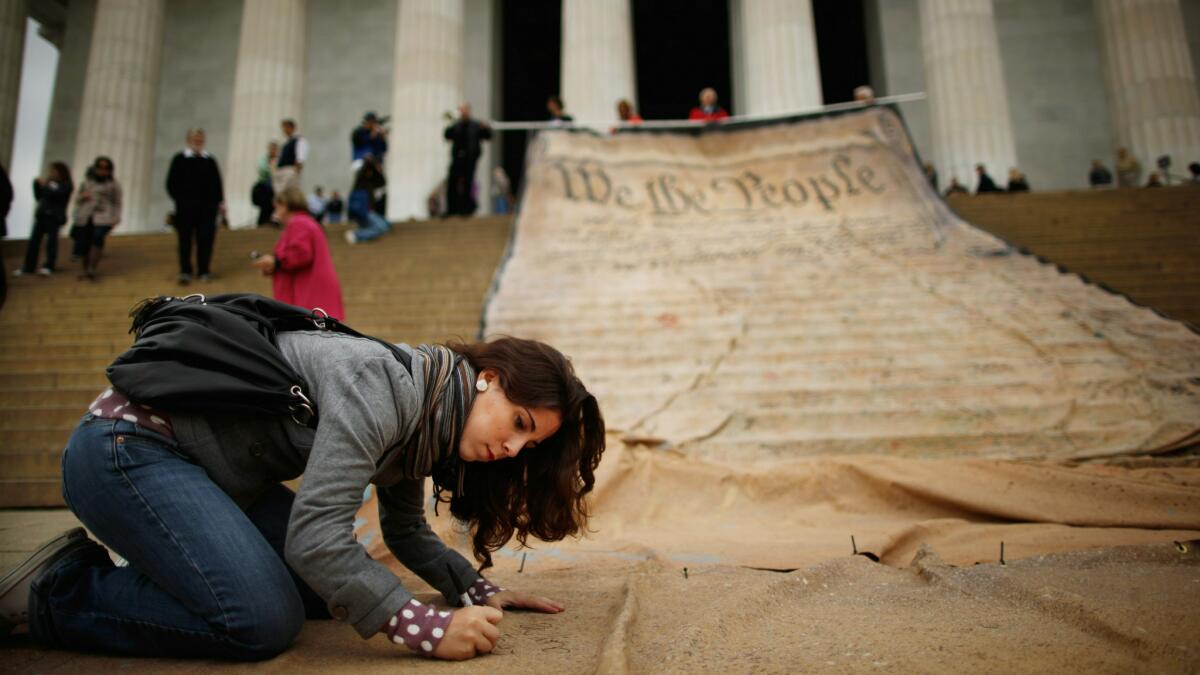Editorial: Prop 59: Don’t amend the Constitution over Citizens United

- Share via
Citizens United, the 2010 Supreme Court decision holding that corporations had a 1st Amendment right to spend unlimited amounts of money to influence elections, has no shortage of critics. Editorial writers (including the ones behind this page) have assailed the decision. President Obama denounced it in a State of the Union address with several justices sitting in attendance. In a 2015 Bloomberg poll, 78% of respondents said that it should be overturned.
But is the decision so outrageous that it requires the radical step of amending the U.S. Constitution? That’s the question California voters will be pondering in November as they contemplate Proposition 59, which asks if the state’s elected officials should use “all of their constitutional authority, including, but not limited to, proposing and ratifying one or more amendments to the U.S. Constitution” to overturn Citizens United and related decisions.
If we had had our way, this question even wouldn’t be on the ballot. We urged Gov. Brown to veto the legislation that put it there because, unlike other propositions placed before the people in this citadel of popular democracy, Proposition 59 has no binding force. Although its proponents claim that it’s designed to “instruct” state legislators and members of Congress, those officials are entirely free to disregard it. (It also seems like preaching to the choir. Perhaps in an exercise of clairvoyance, the state Legislature had already voted in 2014 to petition Congress to convene a constitutional convention to approve an amendment overturning Citizens United.)
But now that the question is on the ballot, the voters must choose, and so must we. We recommend a No vote, for two reasons.
First, amending the Constitution is a difficult process by design, and not every unwise Supreme Court decision justifies the attempt. Citizens United, which was decided only six years ago by a mere 5-4 majority, could plausibly be reconsidered or narrowed with a change in the court’s membership. Hillary Clinton, for one, has made it clear that she would appoint justices likely to reconsider the ruling. (She also says she would fight for a constitutional amendment to overturn the ruling “if necessary.”)
Even if it weren’t overturned, many of the evils for which it has become a metaphor — undisclosed “dark money” in political campaigns, for example — can be addressed by simple legislation. We don’t rule out supporting an appropriately crafted constitutional amendment in the future, but we see no reason to rush.
That brings us to our second concern about Proposition 59: Like a similar measure approved by Los Angeles city voters in 2013, Proposition 59 doesn’t specify what a proposed constitutional amendment would actually say.
True, Proposition 59 suggests that an amendment or amendments would reverse Citizens United and “other applicable judicial precedents” — a reference mainly to Buckley vs. Valeo, a 1976 decision holding that individuals could spend unlimited amounts of their money on independent political expenditures. But the measure also suggests that a constitutional amendment would “make clear that corporations should not have the same constitutional rights as human beings.”
That’s a powerful, even poetic, pronouncement, but what does it mean? Would corporations lose only free-speech rights or other rights as well, such as the right to be free from unreasonable searches and seizures at their places of business or to due process of law if they were sued? Would nonprofit as well as for-profit corporations be affected? What about the 1st Amendment rights of corporations that publish newspapers or broadcast the nightly news?
Supporters of Proposition 59 suggest that such questions could be taken up later when members of Congress, after being “instructed” by the voters, got down to the hard work of drafting an amendment. But that seems backward: You don’t decide that the Constitution should be amended, and then decide what the amendment should say. When it comes to amending the Bill of Rights, the exact words matter.
We share the frustration over Citizens United (the decision) and “Citizens United” (the metaphor for the outsize role of money in politics). We also recognize that the very reason we opposed placing this question on the ballot — that it’s purely advisory — could be offered as a justification for voting Yes; why not take advantage of this opportunity to “make a statement”?
Fair enough, but if that statement is: “Amend the Constitution; details to follow,” we don’t think it’s a message worth sending.
Follow the Opinion section on Twitter @latimesopinion or Facebook
ALSO
Tired, torn, disgusted by this election? You still have to vote.
It’s been an otherworldly campaign, and we’re not returning to Earth anytime soon
Fear and loathing and long lines on election day
More to Read
A cure for the common opinion
Get thought-provoking perspectives with our weekly newsletter.
You may occasionally receive promotional content from the Los Angeles Times.









